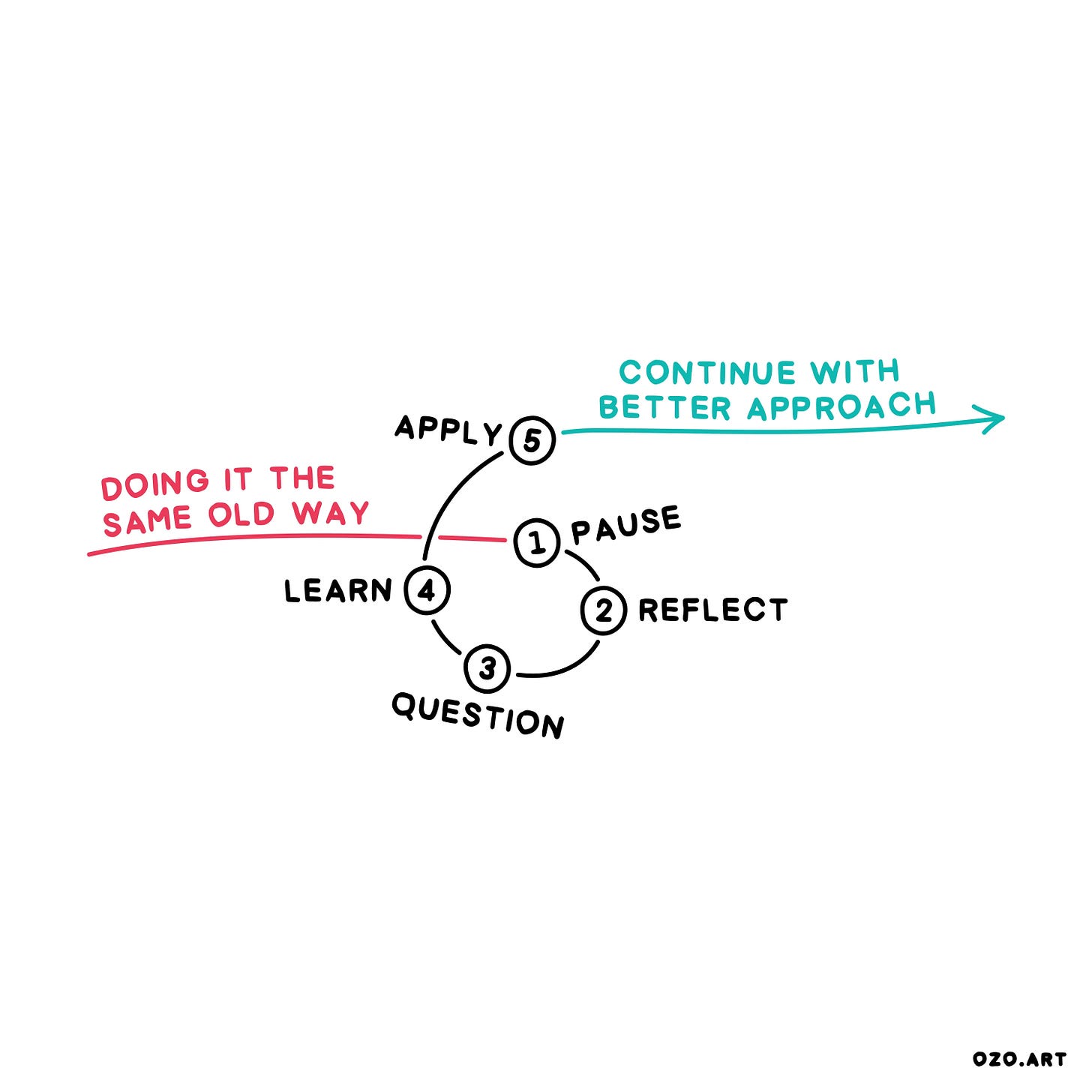I love a long hot bath, it's probably my favourite way to relax. But they don't stay hot forever and after a while you end up sat in a lukewarm soup of your own filth, sweat and skin cells. Not cold enough to get out, not hot enough to enjoy, just sitting there, with fingers and toes slowly turning into prunes, wondering what you’re doing with your existence? That’s how I felt, except it wasn't just in the bath, it was a relationship.
My Story of Living Just Below the Threshold
When I was 17, it was a very good year 🎶. I met a girl at college. We clicked together immediately, like two jigsaw pieces, except maybe from different jigsaw puzzles because: spoiler alert, things didn’t exactly work out. We built a relationship full of fun, travel, gigs, and wild plans about the future.
Then came university and after that, reality set in. We talked about buying a house, having kids, and building a life, but instead of saving, we spent our money on exotic trips and overpriced concert tickets. We were stuck in third gear, pootling around town at a safe speed but going nowhere. I didn't see a problem, it was a gradual one that took ten years to fully form but there was a problem.
Then she dropped the classic line, "Let’s take a break." For her, it was to gain clarity. For me, I didn’t see it coming, but when we went on a no contact break for a month it became a neon sign flashing: “YOUR LIFE IS A MESS.”
During the silence, I realised I’d been living on autopilot, clinging to a relationship that wasn’t awful but wasn’t fulfilling either. When we met again after the month, she wanted to make it work. Me? I’d already hit the eject button in my mind.
Breaking up wasn’t easy, but neither is staying in a relationship you know is wrong. The “break” that made her realise that absence made the heart grow fonder, was my tipping point. I hadn't realised I was teetering on the edge for years and it turned out I needed a little push to finally reach my threshold of action.
In the next year I made some massive changes in my life, I bought the house, I started exercising, eating well, looking after myself, all the classic post break up cliches. I started a charity and I met the woman I would go on to have two kids with. Those things would never have happened if my ex hadn't found her tipping point before I did.
The Region Beta Paradox?
I’ve mentioned my Tipping Point and reaching my Threshold of Action already, but the Region Beta Paradox might be a new term. It has been popularised by
on his Modern Wisdom Podcast (less than 2 minutes) recently and there’s some more nuance in the Wikipedia article if you’d like, but to break it down for the purpose of this post.Imagine you're in a greasy spoon cafe, sipping weak tea from a chipped mug waiting for your full English breakfast with extra bacon and you’re sitting on a squeaky, wobbly chair. It’s not collapsing under you, but every time you shift, it rocks from side to side and squeaks like a dying dolphin. Do you get up and ask for a better chair? Of course not, especially if you're British, you grin and bear it. Plus it would take effort. Instead, you sit there, pretending the chair’s fine and the tea’s lovely while dripping cold beans down your jumper and trying not to move, because every time you do it sounds like a dolphin orgy. Welcome to the Region Beta Paradox, one strand of it anyway.
Psychologist Daniel Gilbert explains the weird phenomenon, he coined in his book "Stumbling on Happiness."
You live a mile away from your workplace and your options to get there on a morning are walking or riding your bike, you’ll probably save yourself the hassle of getting your bike out of the shed, finding your helmet, putting on your cycling clips, riding to work and locking the bike up or carrying it upstairs to your office. It would still be quicker to ride, but it feels like more effort.
If you moved to another workplace two miles away, it’s a no brainer to get the bike out. Region Beta is the difference between these two decisions, the grey area where you’re not sure if one or the other is the better choice. The longer the journey the more sense it makes to get on your bike.
But this isn't just about transport, it can be applied broadly to life in general. So the moral is that sometimes we procrastinate on change because it seems like too much effort, even when staying stuck costs us more in the long run. We get comfortable with our own mediocrity and just like laying in a nice warm, comfy, cosy bed when it's raining outside, it takes extraordinary effort to get out.
People are more likely to act when things are terrible than when they’re just mildly bad. Why? Because mildly bad is manageable. It’s the metaphorical lukewarm bath of life, too tolerable to make you grab a towel and move on.
Examples of the Region Beta Paradox in Action
Fitness: You’re not thrilled with your muffin top, your bacon belt, your beer belly, your love handles but your trousers still fit and you haven't had a health scare… yet. Why start jogging now?
Relationships: Your partner isn’t exactly sweeping you off your feet, but they don’t chew with their mouth open or snore like a Wookie. Is that passion? Probably not. But it's something, right?
Work: Your job feels like watching paint dry, you haven’t progressed in years, but your boss isn’t a tyrant, and they pay you money each month, so you stay… for 19 years.
Housing: Your flat’s got peeling wallpaper and the radiator sounds like it’s summoning a demon, but the roof isn't leaking, you haven't seen a rat in months and the rent is reasonable.
Why We Get Stuck
Us humans can be “lazy creatures” (this will be a link in the future), we can give cats and sloths a run for their money any day of the week. So as long as our lives aren’t actively on fire, we’ll sit in the metaphorical smoke and convince ourselves it’s fine. Indefinitely.
Change requires effort, and putting in the effort can be bloody exhausting. And heading off into the unknown is scary. What if we move and it’s worse? What if we leave and regret it? What if I try something new and it doesn't work? And before we know it we’ve procrastinated through another year.
When I started writing on Substack, writing wasn't something I had aspired to do, it was the product of lurking for a bit and then thinking, why not give it a go. And so I did, and it's changed my life in more ways than I probably realise. I'm not sure what I would have been doing if I hadn't started writing but I know it would have been nothing productive. A mini tipping point right there.
Why Rock Bottom Spurs Action and Why You Shouldn’t Wait
Reaching rock bottom is when you've been sinking for ages and you finally hit the ocean floor and then life smacks you in the face with a fish. It could be a health scare, a breakup, or a financial crisis that forces you to move because staying still becomes unbearable. But why wait for the fish slap? Recognising early warning signs means you can jump ship into a lifeboat before the situation sinks you. It can be difficult to realise when it’s happening to you.
How to Break Free from the Region Beta Paradox
Recognise There is a Problem: Where are you stuck? Job? Relationship? That weird chair? Scan your life, are there any areas that are just a bit "Meh?"
Create Fake Urgency: Imagine your tipping point. What would make you act? What would it look like if the worst happened? Pretend it’s happening now.
Small Steps, Big Wins: Start with one tiny action. Update your CV, go for a walk, Google “chairs that don’t squeak.” Look for opportunities to connect with your partner or consider the dreaded “break.”
Reward Yourself: Celebrate progress, even if it’s small. Progress is progress, if you make a leap, allow yourself to be happy about it, even if that means breaking up with a long term partner.
Phone a Friend: Sometimes you're too emotionally invested in your own bullshit to really recognise what is holding you back. Ask a mate for some honest feedback, they may be able to see through the smoke you can’t see past.
I was reading a post by the amazing
and saw the following graphic which I think illustrates how to break free from pattern really well.The “Tipping Point” in Janis’ image is point 1.

You can check out Janis’ post here:
The Power of Tipping Points
The moments that push us past our threshold of action can be painful but transformative. Whether it’s a breakup, a breakdown, or just a dying dolphin chair, these tipping points force us to decide: Are we staying stuck, or are we moving forward?
As the Tony Robbins saying goes: "Change happens when the pain of staying the same outweighs the pain of change." So, what’s the mildly uncomfortable, squeaky chair in your life? And when are you finally going to get up?
This is my entry to the Kaleidoscope Project Monthly Challenge for January, where the theme is "The Tipping Point", you can check out the launch post here:
If you are a fan of the poetic I have also penned some poems with the theme of the tipping point and you can view them in compendium form in the following post:
On the Brink of Change
Myself and Moon Arica have hosted a collaboration this month, The Kaleidacope Challenge, with the aim being to inspire writers and creators to come together to tackle a common topic to see the breath of results that come from the same theme.










Brilliant post Mark, you had me with the imagery with the bath. 😂
The Region Beta Paradox is a very interesting concept, that activation energy required to make a change can relate to many areas of our lives. But do you think you can form false crises by overindulging in this concept?
I personally create my own urgency, whether it be through deadlines or noticing an abstract shift in direction, values, morals, etc. which then forces me to prioritise making a change. But sometimes this can be exhausting and when unable to make a change due to things out of my control, I may compound upon a feeling of helplessness. Nonetheless, generally being self-aware of settling for mediocrity or procrastinating from taking necessary action would probably have a net benefit in a variety of situations.
How do you see yourself striking a balance between keeping circumstances constant until outcomes are achieved and making significant changes to your outlook, circumstances or problems you face?
That was one hell of an article, Mark.
I hate to admit it but my working situation is exactly like you described.
It was also my romantic relationship until I pushed to the threshold and broke free.
We humans have the potential for greatness.
But we also have the potential to be lazy cats.
I think we need to do reality checks often and be surrounded by people that do not tolerate laziness.